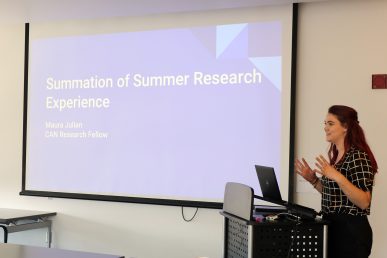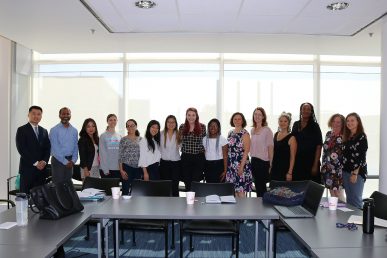New UIC fellowships cultivate future cancer experts, promote inclusion
Two new University of Illinois at Chicago fellowships are helping to advance cancer care and increase diversity in STEM fields.
One fellowship, created by the University of Illinois Cancer Center, is a first-of-its-kind, post-graduate program for primary care providers meant to expand the traditional definition of cancer care to more significantly focus on survivorship.
“As of January 2019, there are 16.9 million cancer survivors. By 2040, that figure is expected to exceed 26 million,” said Dr. Susan Hong, director of the center’s survivorship program. “Yet despite advances in cancer screening and treatment leading to improved survival, many cancer survivors experience significant negative consequences. This is especially true for minority and underserved cancer survivors where studies demonstrate a growing disparity in the survivorship experience.”
To meet this need, Hong and the cancer center worked with the UIC College of Medicine to develop the first “oncogeneralist” fellowship program in the country, which teaches doctors additional skills related to the unique needs of the growing number of complex cancer survivors.
“The trained oncogeneralist will be able to care for high-risk cancer survivors and individuals at risk for treatment-related toxicities in the community setting, making specialized care more accessible to patients who need it most,” Hong said. “We hope this will inspire other academic cancer centers to create similar programs and models of care.”
The fellowship offers doctors two tracks: a two-year research track or a one-year clinical track.
Another fellowship, called Can Research, is for UIC undergraduate students interested in learning more about cancer research. Launched this summer, Can Research is the first cancer-focused program in the country specifically for undergraduate students with a disability.
The six-week summer fellowship was developed by faculty from the UIC College of Applied Health Sciences and the UI Cancer Center
“We organized the fellowship around four main pillars to provide the students with immersive research experiences with top biomedical and social science cancer researchers, leadership and self-advocacy training, mentoring and role modeling, and field experiences with a variety of industry and community-based partners,” said Susan Magasi, associate professor of occupational therapy and disability studies in the UIC College of Applied Health Sciences. “We really wanted the fellows to come away from this experience with not just deeper understanding of science and cancer research but also recognizing the passion, commitment and professional networking required to propel cancer research and clinical care forward.”

Magasi worked with the UI Cancer Center’s Davyd Chung to develop the program, in part because it reflects UIC’s mission of inclusion, but also fills an unmet need to provide career opportunities for people with disabilities with an interest in health fields.
“We not only need people with diverse backgrounds and experiences to participate in and lead research, but we also need to do a better job of recognizing the value of early-career exposures and self-advocacy in supporting the next wave of scientists, physicians and health care leaders,” said Chung, executive director of research and strategic operations. “We need to be more intentional in creating innovative programs to better ensure inclusion of populations that are often not represented, such as people with disabilities. The Can Research Program was developed with that in mind.”
Four UIC students made up the first cohort, which celebrated its conclusion with a capstone event inspired by “Shark Tank” called Dolphin Tank, during which the students synthesized their emergent cancer knowledge and pitched their own skills and experiences as a “product” for cancer research.

